How has the pandemic changed field archaeology?
Nathan Steinmeyer March 16, 2022 0 Comments 121 views
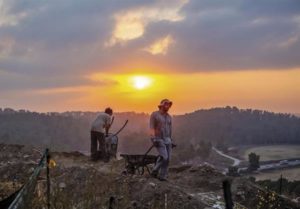

Dusty dawn. Students from Hebrew University haul soil excavated from Khirbet al-Ra‘i at sunrise. Courtesy Ornit Luckatch.
How has the pandemic changed field archaeology? We recently asked leading dig directors what long-term impacts the pandemic will have on field projects and excavations in Israel. Some archaeologists see change on the horizon, others point toward exposed inequalities, and yet others argue that Coronavirus Disease 2019 (COVID-19) will merely be a soon-forgotten bump in the road. Here is what they had to say.
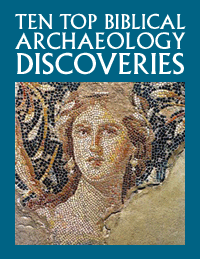

Matthew Adams (Tel Megiddo, W.F. Albright Institute)
Despite not digging with co-directors Israel Finkelstein and Mario Martin at Megiddo in northern Israel in 2020 or 2021, Matthew Adams, as Director of the W.F. Albright Institute in Jerusalem, was able to help several smaller digs get started. Based on this experience, Adams believes there may be a trend toward smaller projects on the horizon: “One thing I learned from the couple of excavations that did go into the field is that they went with smaller teams. I don’t think this means that digs will remain small forever, but now when directors are planning their seasons, they will consider the value of less excavation, slower excavation, and smaller teams versus more excavation, faster excavation, and bigger teams.”
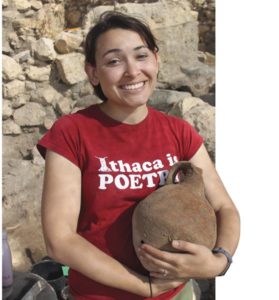

Excavators from Cornell College and William Jessup University dig at Abel Beth Maacah in the far north of Israel. Area Supervisor Fredrika Loew holds an Iron Age IIA jar uncovered in her area. Courtesy Tel Abel Beth Maacah Excavations.
Nava Panitz-Cohen & Naama Yahalom-Mack (Abel Beth Maacah, Hebrew University)
While excavation at Abel Beth Maacah in the far north of Israel was able to continue during the pandemic, the 2020 season lasted only one week, and the dig team the following season was less than half its normal size. But like Adams, Nava Panitz-Cohen and Naama Yahalom-Mack, who co-direct the dig with Robert Mullins of Azusa Pacific University, don’t necessarily view this as a negative. “We learned that small, limited excavation could be very efficient, and sometimes it even makes us select our research questions more precisely,” they said. “Going forward, I think we will combine large seasons with small, targeted ones.”
Daniel Master (Tel Shimron, Wheaton College)
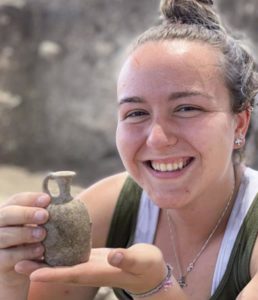

Baylor student Abigail Keeney holds a Middle Bronze Age juglet (c. 2000–1550 B.C.E.) found at Tel Shimron in northern Israel. Courtesy Tel Shimron Excavation.
Although Shimron in northern Israel was in the field in 2021, they missed the previous season due to COVID-19. That did not slow down co-directors Daniel Master and Mario Martin’s writing and publication efforts, however, thanks to the team’s forethought in digitizing their project records. “There is real value in having all of your records digitized so that you are not beholden to one warehouse or physical collection of books in one country,” said Master. “I would like to see actions taken to ensure that not only project directors but also the national agency that is responsible for caring for the antiquities of the country have a complete digital record. That way multiple people have access, and the records are not just stuck someplace.”
Aren Maeir (Tell es-Safi/Gath, Bar-Ilan University)
Aren Maeir, long-time director of the Tell es-Safi/Gath excavation in southern Israel, used the loss of the 2020 field season to write and publish. He hopes that other excavators did the same: “I think it is the responsibility of archaeologists to excavate in a manner that they can then publish. It is irresponsible to continue excavating to no end, leaving tons of unpublished material for the next generation. It is our duty to conduct our excavations and complete them and not leave a burden of work for the future.”
Yosef Garfinkel (Khirbet al-Ra‘i, Hebrew University)
Yosef Garfinkel, director at Khirbet al-Ra‘i in southern Israel, discussed the potential volunteer shortages that could arise if the pandemic continues: “If COVID continues for decades, it is possible that we will not have volunteers for ten years or more—or maybe that we will stop having volunteers at all. We can have conferences by Zoom, but we cannot excavate by Zoom. Maybe we will have to change the way we excavate. Maybe we will need to work with Israeli youth or excavate with paid workers instead.”
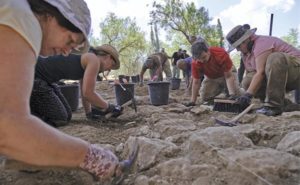

Volunteers carefully dig the remains of a temple courtyard at Tel Moza, located only 4 miles from Jerusalem. The temple, recently excavated by archaeologists, functioned from the eighth–sixth centuries B.C.E. Courtesy David Moulis, Tel Moza Expedition Project.
Jennie Ebeling (Jezreel Expedition, University of Evansville)
Jennie Ebeling co-directs, with Norma Franklin, the Jezreel Expedition in northern Israel. They have completed field excavation and are currently working on publishing their findings. Ebeling discussed the increased disparities that pandemic restrictions have created for access to field work. “In terms of field archaeology, the disparities in access to resources for foreign archaeologists working in Israel have become really obvious,” she explained. “Over the next few years, we are going to be looking for interested and invested people to step up and make it possible for students and archaeologists to go to Israel, Jordan, and Cyprus to get field experience. If we want to have North Americans represented in these projects in the Middle East, then we are going to have to make it happen.”
Oded Lipschits (Tel Azekah & Tel Moza, Tel Aviv University)
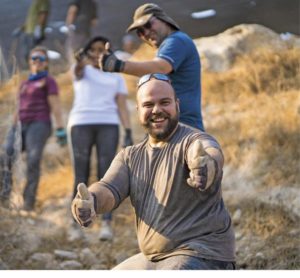

Tel Aviv University student Steve De Santiago celebrates the return of happier days at Azekah in the Shephelah (foothills between the coastal plain and the Judean hill country). Courtesy Benjamin Sitzmann, Lautenschlager Azekah Expedition.
Oded Lipschits was barely slowed by the pandemic and even brought a large group of volunteers to excavate at Tel Moza, the site of a remarkable temple in central Israel in 2021. While the pandemic presented some difficulties in terms of ensuring team adherence to safety protocols, he feels that COVID-19 ultimately changed little in the world of archaeology. “When the project begins, everything is normal. We work with the same students, the same tools, the same shade nets. We cannot run a ‘digital’ excavation. We need people, we need tools, we need buckets, and we need to remove as much dust and soil as we can,” Lipschits said. “So once COVID ends, I think that archaeology should—and probably will—continue as before.”
Read more in Bible History Daily:
All-Access members, read more in the BAS Library:
Digs 2020: 8 Stops in Northern Israel
Digs 2021: Digging During a Pandemic
Not a BAS Library or All-Access Member yet? Join today.

